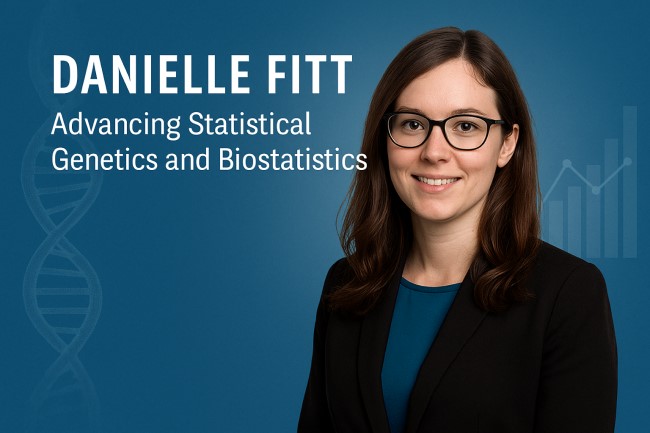Danielle Fitt: A Leading Researcher in Statistical Genetics and Biostatistics

Danielle Fitt’s academic journey began with a passion for mathematics and science, subjects that fueled her desire to understand complex systems. She pursued higher education at Cardiff University, where she demonstrated remarkable ability in advanced mathematics.
In 2017, she completed her Master of Mathematics (MMath), a program that provided her with rigorous training in probability, modelling, and applied mathematics. She then advanced directly into doctoral research, completing her PhD in Mathematics in 2020. Her doctoral studies focused on probabilistic modelling, uncertainty quantification, and solid mechanics, areas that gave her a strong quantitative foundation to build a career in biostatistics.
During her student years, Fitt actively engaged with academic communities. She contributed to initiatives such as the Cardiff Materials Research Network and Women in Mathematics, showing both academic ambition and a commitment to inclusivity within the sciences.
Transition Into Biostatistics
After her PhD, Danielle Fitt transitioned into fields that allowed her to apply mathematical methods to real-world health challenges. She developed expertise in statistical genetics, where the combination of big data, statistical methods, and biomedical knowledge creates opportunities to unlock insights into human diseases.
This shift reflects her broader goal: using data-driven research to address medical and societal challenges. The integration of her mathematics background into biostatistics prepared her for significant roles in academia and government.
Professional Career
Early Roles and Experience
Following her PhD, Danielle Fitt gained experience in both academic and applied research environments. She worked as a postgraduate tutor at Cardiff University, supporting the next generation of mathematics students, and as a research associate at Keele University, where she applied computational techniques and artificial intelligence to scientific problems such as modelling and simulations.
Her growing expertise later took her to the Welsh Government, where she served as a Higher Statistical Officer from 2021 to 2022. In this role, she analyzed higher education data from UCAS and HESA, producing statistical reports to inform educational policies. Her ability to manage and interpret large datasets highlighted her adaptability as a data scientist and policy contributor.
Research Officer at Swansea University
From 2022 to 2023, Fitt worked at Swansea University as a Research Officer and Data Scientist. She contributed to the DECODE project, which aimed to improve healthcare access for individuals with intellectual disabilities. This role demonstrated her ability to combine technical expertise with healthcare priorities, focusing on reducing inequalities and improving patient outcomes.
Research Associate at Cardiff University
Since July 2023, Danielle Fitt has served as a Research Associate in Statistical Genetics and Biostatistics at Cardiff University. Her current research focuses on Huntington’s Disease, a hereditary neurodegenerative disorder that causes psychiatric, cognitive, and behavioural symptoms.
Research Focus
Huntington’s Disease
Huntington’s Disease is caused by genetic mutations and has no known cure, making research into its progression and risk factors particularly urgent. Danielle Fitt applies multivariate and longitudinal statistical methods to study how genetic predispositions interact with environmental influences.
Her work uses large-scale datasets, combining genetic information, psychiatric evaluations, and behavioural data. By applying advanced statistical modelling, she aims to detect patterns that traditional medical studies may miss. This innovative approach could help identify early risk factors, opening pathways to new treatment strategies.
Broader Implications of Her Work
While Huntington’s Disease is a central focus, Fitt’s expertise extends to psychiatric and genetic disorders more broadly. Her statistical genetics background allows her to study the underlying structures of complex diseases, potentially contributing to breakthroughs in personalized medicine. Treatments tailored to individual genetic profiles are becoming the future of healthcare, and researchers like Fitt are at the forefront of this transformation.
Contributions to Academia and Society
Academic Community Engagement
Danielle Fitt has consistently shown dedication to building inclusive and collaborative academic spaces. Her involvement in Women in Mathematics highlights her advocacy for gender equality in science, while her teaching experience illustrates her commitment to mentoring students.
Mental Health and Genetic Research
Her work also contributes to raising awareness about the genetic and environmental factors shaping mental health disorders. By highlighting the complex interplay of genetics and lifestyle factors, she is helping to inform future strategies for prevention and treatment.
Volunteer Work
Beyond academia, Danielle Fitt volunteered as a Physical Education Tutor at Wyclif Independent Christian School in 2012. This early experience reflects her long-standing commitment to education, mentorship, and community service.
Cardiff University Partnership
Cardiff University is recognized internationally for excellence in health and life sciences, and Fitt’s work strengthens its reputation as a hub of biomedical research. By contributing to its expanding research in statistical genetics, she reinforces Cardiff’s mission to combine rigorous mathematics with practical healthcare solutions.
Her presence at Cardiff supports interdisciplinary collaboration, ensuring her research has both academic depth and direct impact on public health.
Looking Ahead
Danielle Fitt’s career is still in its early stages, yet her contributions already signal long-term significance. Her innovative use of statistical modelling in biomedical sciences positions her as a rising leader in biostatistics.
The coming years will likely see her research deepen into Huntington’s Disease, while also expanding to other psychiatric and genetic conditions. Her ability to merge mathematics with healthcare applications is precisely what modern science requires in tackling complex diseases.
Conclusion
Danielle Fitt exemplifies the modern interdisciplinary researcher: mathematically rigorous, biomedically insightful, and socially engaged. From her academic roots at Cardiff University to her current role in statistical genetics and biostatistics, she continues to advance our understanding of complex diseases.
Her work on Huntington’s Disease provides hope for patients and families facing neurodegenerative disorders, while her broader research vision contributes to the future of personalized medicine. By combining technical expertise with compassion for societal challenges, Danielle Fitt is shaping a career that promises to leave a lasting legacy in both science and healthcare.



